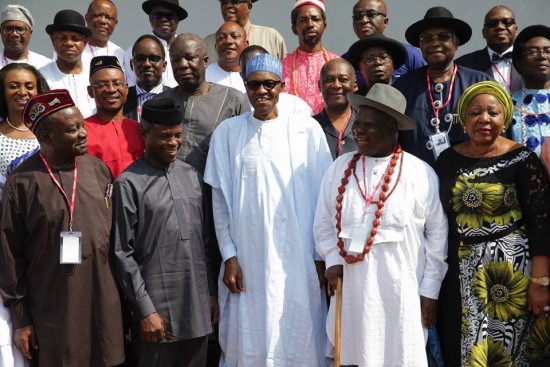
Recent moves by the presidency to transform the Niger Delta to make it more habitable heralds a new vision which has been greeted with enthusiasm by well-meaning Nigerians.
This is coming after the visit of Pan Niger Delta Forum (PANDEF) to President Muhammed Buhari in November 2016 and the subsequent tour of the region by Acting President Yemi Osinbajo to engage with the leadership and people of oil producing communities.
PANDEF, under the leadership of an Ijaw leader and a former Federal Commissioner of Information, Chief Edwin Clark, had articulated a 16-point demand from the Federal Government.
The demands include continuous implementation of the presidential amnesty programme; ensuring justice for the region; reduction of military presence in the Niger Delta; alleviating the pains of internally displaced persons; implementation of the Ogoni cleanup and environmental remediation; takeoff of the maritime university, development of key critical social infrastructure; security surveillance and protection of oil and gas infrastructure.
Others are relocation of administrative and operational headquarters of the international oil companies to the Niger Delta region, power supply; economic development and empowerment, inclusive participation in the oil and gas industry and ownership of oil blocs; restructuring and funding of the Niger Delta Development Commission; strengthening the Niger Delta ministry; addressing the plights of Bakassi indigenes and demand for fiscal federalism.
It is common knowledge that the Niger Delta region has suffered so much as a result of environmental degradation over the years caused by oil spillage amongst others. As a result of this, the ecosystem of the region has been severely damaged. The consequential effects arising from this damage are numerous.
Air pollution like gas flaring and other toxic air pollutants is known to cause asthma, pneumonia, and other respiratory diseases. Many people in the region have died due to the effects of air pollution; yet the region is without adequate health care facilities. In most parts of the region, potable water has become scarce with marine life getting progressively damaged.
In the face of current realities, efforts by the Federal Government to forge partnership with oil producing states, local governments, oil companies, civil society organisations and other stakeholders for the rapid development of all oil producing communities in the country is a noble venture.
Government’s plan to treat oil-producing communities as special development areas is highly commendable and should be fully implemented. During his tour to one of the oil producing states, the Acting President also hinted that government was collaborating with the oil majors to establish modular refineries that will engage operators of illegal refineries. Osinbajo hinted on how the blessing of oil had paradoxically become a curse as the means of livelihood of the people like fishing and farming had constantly been destroyed by pollution and revenue earned over the years disappeared in many cases.
While evolving this new vision, it looks a little obvious what the people of the region wants. It presents a good opportunity for the government to synthesize various demands including the one presented by the Niger Delta People’s Congress and even the militants so as to build a lasting vision. This opportunity must not be glossed over. As President Muhammadu Buhari once said, evolving a vision that is purely lip service or designed to perpetuate the hegemony of a select people will surely backfire.